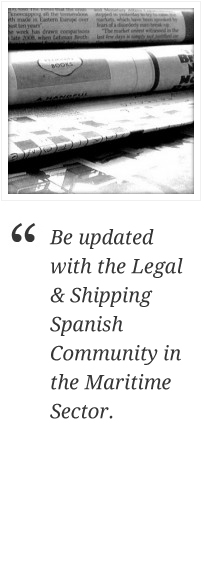February: CIRCULAR 7A/2001
TO SHIPOWNERS / LINES CALLING TO SPANISH PORTS:
SPANISH PORT TARIFF T-3 : RECENT CHANGES IN REGULATION
The T-3 port tariff is a price that the different Port Authorities apply for the different port services they offer regarding cargo, and regarding cargo and passengers. The Spanish Government (Transport Ministry) rules this port tariff through Ministerial Orders and decides what port services it should include (access to port, discharge, handling, storage etc.).
The Spanish Ports and Merchant Marine Law 27/1992 established that the port tariff is a private price, that it will be regulated by the “Ministerio de Fomento†or Transport Ministry -therefore without rank condition of law-, and that it will then be established and approved by each Port Authority, who will then in turn invoice it to the debtor party (the shipowner/charterer/operator through the ship agent).
However, the Spanish Courts have recently decided (e.g. Judgements of the Court of Appeals dated 26.2.1998, 27.2.1998, 19.10.1999, 9.2.2000 and 1.3.2000), that these prices (T-3) directly paid by shipowners/operators through their shipagents, and indirectly paid by cargo owners, should be considered null, and the amount paid should be returned by the Port Authorities to the Shipowner. The Courts understand that these prices are really a public price or tax and that they should therefore need to be ruled by law, and not via Ministerial Order.
However the Government has now published a new Law, 14/2000, where they have until the 1st of April 2001 to present before the Parliament a law draft modifying the regime of the port tariffs established in the 1992 Ports Law in order to contemplate tariff liberty.
This new regulation has been approved in order to give a stronger control over the port tariffs while a new regulation is being build by the Government. It also provides a control in relation to the payment of the T-3 tariffs as it tries to avoid the execution of the decisions established by the various Courts: a) The Port Authorities having to return the amount of the T-3 already paid by the claimant Shipowners/Charterers, and b) The future non-payment of the T-3 tariff s alleging that the Courts have decided they are null.
This law, Ley 14/2000, de 29 de diciembre, de Medidas Fiscales, Administrativas y del Orden Social, came into force last 1st January 2001, and various important points to be considered are:
- The new regulation allows the Port Authorities to recover from those parties the amount debited and sentenced by the Court as non debited.
- The new regulation gives rank condition of law to the Ministerial Orders that are presently regulating the port tariffs. The Government tries to prevent that more cases are taken to Court alleging the nullity of the T-3 tariff and also tries to prevent the non payment of the T-3.
- There is a 20 days term to pay the tariffs debited to the Port Authorities as from the issuance of the invoices. Once expired this time bar, the Port Authority will notify to the party the debt, and legal interests will be applied and will start to run until the date of payment, the debt being therefore increased four points up from the legal interest stipulated rate.
- Following the 20 days non payment, a Certificate will be issued by the Port Authority. This Certificate will be enough to entitle the Port Authority to start a civil action (Executive action or “Acción ejecutivaâ€) as per the recently ruled new Spanish Civil Procedure.
- There is a 5 years prescription for this action.
- The Civil Jurisdiction will be the sole competent jurisdiction to liase with all the discrepancies regarding the payment of the port tariffs.
- There is however the possibility to claim before the Council of Directors of the Port Authority before starting a civil action. If in three months the Port Authority has not pronounced, the civil procedure is automatically opened. It is important to note that this possibility does not exempt the obligation established to pay the tariffs within the 20 days of the issuance of the corresponding invoice.
From all the above we can conclude saying that the Spanish Government will apparently control all the port tariffs, and also provides measures in order to recover all the prices or tariffs dictaminated by the Courts of Justice as non payable to the Port Authorities by the parties involved (shipowners/charterers/operators/shipagents).

